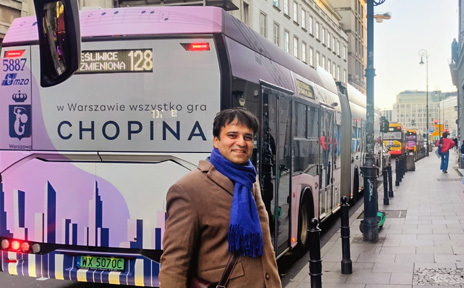- By Murtaza Ali Khan
As a cultural journalist and critic, I have often believed that true diplomacy happens not only in embassies or conference halls but also in museums, art galleries, and over dinner tables where ideas flow freely. My recent visit to Warsaw, Poland from October 20 to 22, 2025, as part of a study program organized by the Polish Ministry of Foreign Affairs and supported by the Polish Institute New Delhi reaffirmed this belief.
I arrived in Warsaw on a bright autumn afternoon, greeted warmly at Chopin Airport by our coordinator and interpreter, whose effortless professionalism set the tone for the days ahead. After checking into my hotel, I headed to my first meeting—with the Director of the Department of Foreign Cooperation at the Ministry of Culture and National Heritage. The Director of Polish Institute New Delhi also joined us on the occasion, adding a powerful Indo-Polish focus to the conversation.
The discussion largely touched on the growing cultural ties between India and Poland, emphasizing the need to facilitate not only governmental partnerships but also exchanges among artists, filmmakers, and cultural scholars. The ministry representative spoke passionately about her ministry’s commitment to strengthening Poland’s cultural presence in South Asia and exploring new avenues for cooperation in cinema, heritage conservation, and the performing arts.
Later that afternoon, I visited the POLIN Museum of the History of Polish Jews, one of Warsaw’s most profound spaces of remembrance. Walking through its immersive exhibits, I was deeply moved by how Poland confronts its layered history with both honesty and empathy. For a country that has endured so much, the POLIN Museum stands as a symbol of reconciliation through education and art.

The evening concluded with dinner at Pod Gigantami, a historic restaurant known for its Old Warsaw charm, where over plates of exquisite Polish cuisine, conversations with fellow participants and Polish hosts revolved around cross-cultural storytelling and the shared power of cinema to build empathy.
The second day began with a meeting at the Ministry of Foreign Affairs, where I interacted with the Deputy Director of the Department of Cultural Diplomacy. The Deputy Director outlined Poland’s vision for cultural outreach, focusing on collaborations with media professionals and cultural commentators from Asia. I was particularly intrigued by her emphasis on soft power and the role of cultural narratives in shaping contemporary diplomacy—a theme that resonates deeply with my own work as a critic.
From there, I proceeded to the Museum of Modern Art, where the Museum Director Joanna Mytkowska shared insights into Poland’s evolving contemporary art scene. The museum’s emphasis on social engagement and public dialogue reminded me of similar movements in India’s independent art spaces.

Later, at the Zachęta National Gallery of Art, I got to interact with Museum Director Agnieszka Pindera. At the gallery, I witnessed how modern Polish artists reinterpret national identity in the face of globalization. The discussions with curators and art historians underscored how both India and Poland grapple with questions of memory, modernity, and identity through creative expression.
In the evening, I visited the National Institute of Architecture and Urban Planning (NIAiU), where I learnt about he institute’s initiatives in documenting and preserving architectural heritage. Our conversation drifted toward sustainable design, urban regeneration, and the shared challenges of preserving history while embracing modernization.
Dinner that night capped an intellectually stimulating day with laughter, warmth, and cultural camaraderie thanks to the luminary presence of various stalwarts specialising in Indology.
My final day in Warsaw began with a visit to the National Museum, an architectural gem housing centuries of Polish artistic achievement. From Renaissance masters to avant-garde innovators, the collection offered a sweeping panorama of Poland’s aesthetic evolution. I was particularly struck by the museum’s commitment to accessibility and its efforts to engage younger audiences—a model worth emulating in India’s museum culture.
Visiting the Polish Institute of International Affairs (PISM), proved to be a masterclass in Public Diplomacy as he provided some key insights into his research methodology.
Before departing for Kraków, I reflected on the immense value of such cross-cultural study visits. Beyond formal meetings and museum tours, what stood out was the Polish hospitality, intellectual openness, and genuine curiosity about India’s creative landscape. As someone who has spent years chronicling the intersections of cinema, culture, and identity, I found this journey deeply enriching. It reminded me that cultural diplomacy thrives when built upon shared values, artistic respect, and the courage to engage with history.
Warsaw, buzzing with Chopin’s music, resilient spirit and vibrant cultural energy, left an indelible impression on me. I now head to Krakow for the 2025 Conrad Festival with renewed inspiration and a conviction that art and dialogue still remain our most powerful bridges.
The author
Murtaza Ali Khan is an award-winning journalist who has been covering art, culture, music, and entertainment for a decade and a half. Khan regularly appears on radio and TV as a media historian and cultural commentator. Khan has also curated various cultural initiatives for various Embassies and Cultural Centers. He has also served on the jury of prestigious National Film Awards for 2023 and 2024. He has translated the bestselling book ‘Hindujas and Bollywood,’ launched in London by Bollywood Superstar Akshay Kumar, about the global journey of over 1200 Hindi films from 1950s to 1980s, into English. His education spans science & technology, mass communication, and management.
Murtaza Ali Khan
Critic | Curator | Journalist | Historian
Google | Wikipedia
Twitter | Facebook | Muck Rack | LinkedIn
Selected Articles
The Sunday Guardian | Firstpost
The Hindu | The Daily Guardian
The New Indian Express | The Patriot
The Quint | Newslaundry | Huff Post India/ The Indian Panorama
(Murtaza can be reached at murtaza.jmi@gmail.com / Phone: +91 9717554334)

Leave a Reply